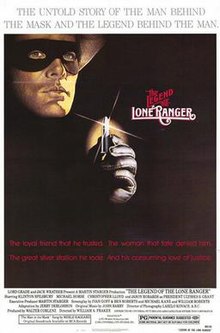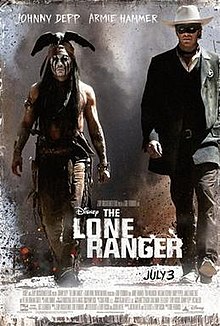When I say that, I mean the character. I've always been attracted to characters who are "superheroes" without super powers, and who work with a close partner. Batman, Captain America, even The Green Hornet (who's actually the Ranger's great-nephew, for the trivia-obsessed).
I also love westerns, as a genre. The Outlaw Josey Wales, The Searchers, Silverado, The Unforgiven...the western is a uniquely American creation, and can be used to say so much about our uniquely American society. Our tendency to fierce independence, our love of community, our unending pursuit of "more," be it money, freedom, space, whatever. It's also, inherently, grappling with the people and societies we unthinkingly ran over to get there.
 The Lone Ranger occupies an odd space in our collective consciousness now, as do most of his contemporaries in the radio/pulp era that spawned so many forgettable characters. He'd probably have become just as obscure as The Spider, or any number of other of that ilk, if not for the TV version starring Clayton Moore as the Ranger, and Jay Silverheels as Tonto. I grew up watching the adventures of The Lone Ranger and Tonto, and, while the series is steeped in the time period in which it was made, both technically, and in it's attitudes, it did (along with many other things) provide a constant reminder of the power of decency, loyalty and friendship.
The Lone Ranger occupies an odd space in our collective consciousness now, as do most of his contemporaries in the radio/pulp era that spawned so many forgettable characters. He'd probably have become just as obscure as The Spider, or any number of other of that ilk, if not for the TV version starring Clayton Moore as the Ranger, and Jay Silverheels as Tonto. I grew up watching the adventures of The Lone Ranger and Tonto, and, while the series is steeped in the time period in which it was made, both technically, and in it's attitudes, it did (along with many other things) provide a constant reminder of the power of decency, loyalty and friendship.In 1981, there was a miserably tin-eared attempt to revive the character as a big-screen franchise, The Legend of the Lone Ranger. Despite some rather breathtaking scenery (courtesy of director, and Oscar-nominated cinematographer, William Fraker, and his cinematographer, the legendary Laszlo Kovacs), the film is hobbled by a zero-charisma leading man in Klinton Spilsbury (who even ended up having every line of dialogue dubbed by James Keach), and a really, really off-putting rhyming, cheesy narration by a I-can't-imagine-he-wasn't-embarrassed Merle Hagard. Entertainment Weekly has a terrific write-up on the whole debacle, here.
The Legend of the Lone Ranger is a pretty epic example of having a lot of great ingredients in a creative stew, and finding out the center (Spilsbury) couldn't hold it all together. The script isn't AWFUL (except for the narration), the direction comes very, very close to the epic scale that they were aiming for, and the supporting cast is pretty awesome. I really like Michael Horse as Tonto, and Christopher Lloyd kills as Butch Cavendish.
It bombed, big time. I honestly think the narration was the biggest culprit. The Ranger was relegated to a few comic book runs, and a couple of fairly miserable attempts at television shows.
Well, as you might guess, that brings us to the most recent attempt to bring the character to the big screen. Jerry Bruckheimer producing, with Gore Verbinski at the helm, Ted Elliot and Terry Rossio working on the screenplay, and Johnny Depp as Tonto. Basically, the team that made the first three (enjoyable, in my opinion) Pirates of the Caribbean movies. They're joined by Armie Hammer as John Reid, aka, The Lone Ranger.
I saw the film last night, after reading numerous miserable, dismissive reviews, and hearing all sorts of comments regarding Johnny Depp's performance...
It's not that damn bad, folks.
Is it perfect? Not by a long shot. There is a big problem in terms of tone, as I was never really sure if the script, credited to Justin Haythe, along with Elliot and Rossio, wanted to really be a Lone Ranger movie, or a parody of one. Even the recent The Green Hornet with Seth Rogan had moments of humor and levity without feeling like a parody, and The Lone Ranger hits that tone for roughly half the running time. The other half is split, pretty evenly, between being a truly kick-ass western action film, and feeling like an out-and-out attack on the character.
I mean, they aren't changing anything from what has been presented before, John Reid returns from the East a lawyer, ready to help bring the West, kicking and screaming, into a more enlightened future. He's deputized by his Texas Ranger brother, Dan, to ride after the Butch Cavendish (William Fichtner, who's just AMAZINGLY great) gang, and the posse is betrayed and ambushed, leaving only John alive. He's rescued and nursed back to health by Tonto.
That story can certainly feed the greenhorn version of The Ranger they present. I was rolling with it. However, the script just sort of leaves him (and by extension Armie Hammer, who's a lovely choice for the role, honestly) in that mode for pretty much the entire running time. It doesn't really feel like he rises to become the Lone Ranger we know, and I, as a fan, wanted to see. Takes steps in that direction? Yes, and maybe they were playing the long game, hoping for a franchise to allow the character to grow.
The box office makes that point moot.
What does work? The direction. The Lone Ranger is, hands down, the best directed of all the major "blockbuster" films I've seen so far this year. The look of the film is PERFECT, and, visually, the perfect way to step away from the powder blue number that Moore and Spilsbury both wore. This feels like a classic western with a pulp-fiction twist. The tactile sense is gritty and realistic, but the details evoke something just beyond realism. I even love Tonto's look, in the context of the film.
It also absolutely reaches the "epic western" look that Fraker was chasing for The Legend of the Lone Ranger. I do admit, shooting in Monument Valley for a film set explicitly in Texas gave me a "that's definitely not Texas" chuckle, but....John Ford made Monument Valley THE look for the American western film, and Verbinski just shoots the shit out of it. Every shot is gorgeous.
Verbinski also can shoot the crap out of action. The final act of this film offers massive destruction and chaos, as is apparently mandatory for a Summer Blockbuster these days, but the sense of what is happening, and where the characters are, in relation to each other and their goals, is clear and easy to follow. Where Pacific Rim lost me with more, more, MORE, no matter how illogical the introduction of that more was (not to mention the murky visuals), The Lone Ranger sets the scene, shows you the pieces on the table, and then begins to gleefully smack them into each other. I admire that so much the more I watch other films descend into "what the hell did I just see" confusion.
I also, and I'm sure I'll get killed for this....LOVE the framing sequence with Tonto on "display" in a 1930's "Wild West" sideshow attraction. Mainly because I think so few people have understood it. Tonto isn't telling the story, the little boy he's talking to is imagining it. There are various moments that give us hints at this, but the killer, for me (and I hope I'm remembering this right), is when the boy becomes upset that Tonto leaves off the story at a point where it appears everyone's going to die. The boy protests that can't happen....
Tonto responds, "it's your story."
And see...I wish the film had hewed more to that, overall. As children, we don't know that The Lone Ranger, as a concept, is a bit out of touch. We don't know that Tonto is, more or less, a caricature (and in my opinion, the film saves this whole area by making Tonto explicitly insane, and presenting a whole tribe of non-caricature, noble, intelligent and worldly Native Americans). The film does sort of hit a batshit-crazy "anything can happen" level of a child's narrative (I'm thinking of the carnivorous rabbits...so weird and disturbing), but doesn't allow for the hero the kid obviously admires (he's wearing the mask, so he obviously plays at being The Ranger), to truly become the HERO. He just flirts with the edges.
I don't think the film is perfect, and it misses a lot of notes I wanted it to hit, but I cannot call it a total loss. It looks exactly like I wanted an updated Lone Ranger to look, and the action set pieces are the best you will see this year. It offers two charismatic leads, and much of the humor landed for me, even when I was wishing for something more serious.
At this point, you probably won't see it in a theatre, but it's worth seeing.



Monument Valley IS the American Western scenery of choice. At least as much as the plains of Spain. I approve of you not caring if it is "really" Texas.
ReplyDelete